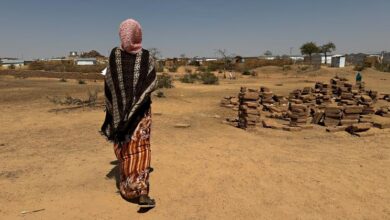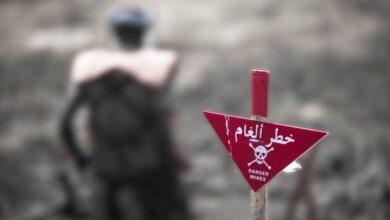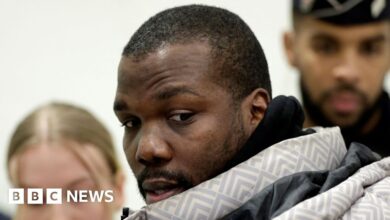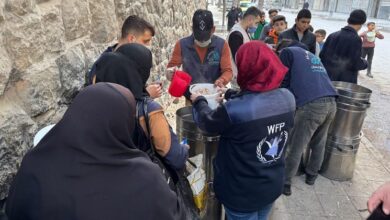Kurds fear the rise of the Islamic State group in Syria
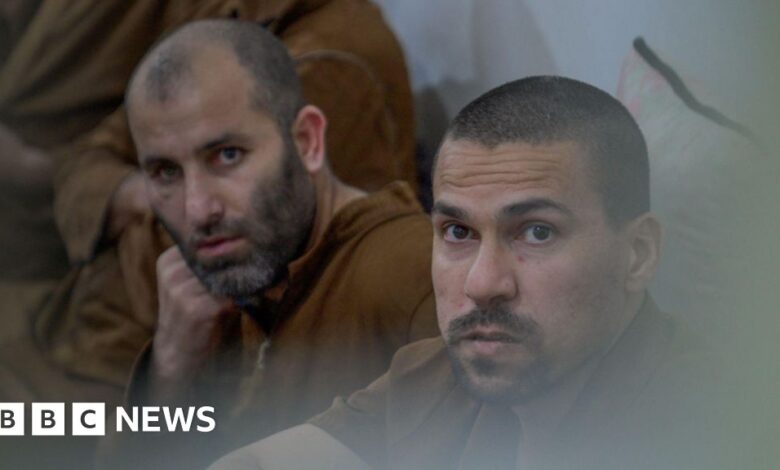
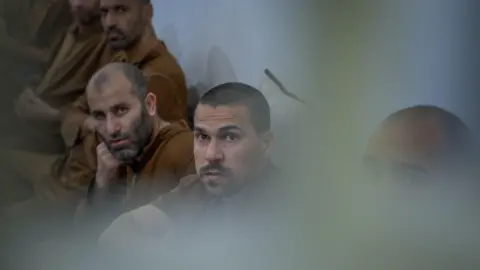 BBC/Michael Steininger
BBC/Michael SteiningerAs the new Syria struggles to take shape, old threats reappear.
The chaos since the overthrow of Bashar al-Assad is “paving the way” for the so-called Islamic State, according to a top Kurdish commander who helped defeat the jihadist group in Syria in 2019. IS) returns. The comeback has begun.
“Daesh activities [IS] has increased significantly and the risk of resurgence has doubled,’ according to General Mazloum Abdi, commander of the Syrian Democratic Forces (SDF), a mainly Kurdish militia alliance backed by the US. “Now they have more capabilities and more opportunities.”
He said that IS rebels had confiscated some weapons and ammunition left behind by Syrian government troops, according to intelligence reports.
And he warned there was a “real threat” that rebels would try to break into prisons run by the SDF here in northeastern Syria, where about 10,000 of their people are being held. The SDF is also holding about 50,000 of their family members in camps.
Our interview with the general took place late at night, at a location we cannot disclose.
He welcomed the fall of the Assad regime – which had detained him four times. But he looked tired and admitted to being frustrated at the prospect of having to fight old battles again.
“We fought against them [IS] and pay 12,000 souls,” he said, referring to the SDF’s losses. “I think to some extent we will have to go back to where we were before.”
The risk of an IS resurgence is growing, he said, because the SDF is coming under increasing attacks from neighboring Turkey – and the rebel factions it supports – and must shift direction. some fighters went to that battle. He told us that the SDF had to stop counter-terrorism operations against IS and that hundreds of prison guards – from a force of thousands – had returned home to protect their villages.
Ankara views the SDF as an extension of the PKK – banned Kurdish separatists who have waged an insurgency for decades and are classified as terrorists by the US and EU. They have long wanted a 30km “buffer zone” in the Kurdish region of northeastern Syria. Since the fall of Assad, it has become increasingly difficult to win it.
“The number one threat today is Türkiye because its air strikes are killing our forces,” General Abdi said. “These attacks must stop because they are distracting us from the security of the detention centers, although we will always do our best,” he said.
Inside Al-Sina, the largest prison for IS prisoners, we saw layers of security and felt the stress of the staff.
The former educational institute in Al-Hasakah city detained about 5,000 people – suspected of being fighters or IS supporters.
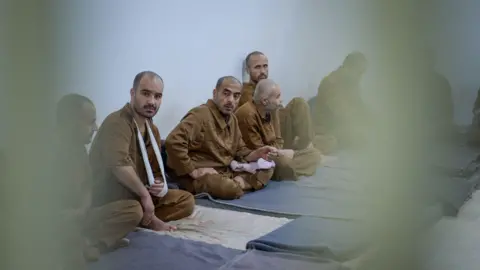 BBC/Michael Steininger
BBC/Michael SteiningerEvery cell door is locked and secured with three latches. The corridors are divided into sections by heavy iron gates. The guards were masked and held batons in their hands. Access here is very rare.
We were allowed a glimpse inside two cells but could not speak to the men inside. They were told we were journalists and had the option to remain anonymous. Very few people have done so. Most sat silently on blankets and thin mattresses. Two men walk on the floor.
Kurdish security sources say most of the prisoners in Al-Sina joined IS until its last stand and are deeply committed to its ideology.
We were led to meet a 28-year-old prisoner – thin and soft-spoken – who did not want to be named. He said he was talking freely, although about important matters he would not say much.
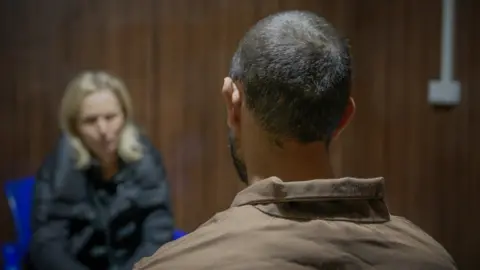 BBC/Michael Steininger
BBC/Michael SteiningerHe told us he left his native Australia at 19 to visit his grandmother in Cyprus.
“From there, one thing led to another,” he said, “and I ended up in Aleppo.” He claimed that he was working with an NGO in the city of Raqqa when IS took over.
I asked him if he had blood on his hands and was he involved in killing anyone? “No, I didn’t,” he replied, almost inaudibly.
And does he support what IS is doing? “I don’t want to answer that question because it could affect my case,” he replied.
He hopes to one day return to Australia, although he is not sure whether he will be welcomed.
There is also hope behind the fences of Roj camp – about three hours’ drive away – that freedom is coming. Somehow.
This vast, bleak enclave – surrounded by walls, fences and watchtowers – is home to nearly 3,000 women and children. They were never tried or convicted, but they are families of IS fighters and supporters.
There were a number of English women in the camp. We met three of them briefly. All said they were told by their lawyers not to say anything.
In a windy corner, we came across a woman willing to talk – Saida Temirbulatova, 47, a former tax inspector in Dagestan. Her nine-year-old son, Ali, stood quietly beside her. She hopes overthrowing Assad will bring freedom to both.
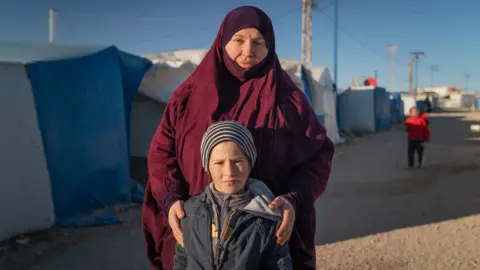 BBC/Michael Steininger
BBC/Michael Steininger“New leader Ahmed al-Sharaa [the head of the Islamist group Hayat Tahrir al-Sham] gave an address, saying he would give everyone freedom. We also want freedom. We want to leave, most likely to Russia. It is the only country that will accept us.”
The camp manager told us that the others believed that ISIS would come to their rescue and liberate them. She asked that we not use her name because she was concerned for her safety.
“Since the fall of Assad, the camp has been quiet,” she said. Usually, when it’s quiet like this, it means women are organizing themselves.” “They packed their bags to go. They said: ‘We will soon leave this camp and renew ourselves. We will return as IS.'”
She said there was a clear change, even among children, who chanted slogans and cursed at passersby. “They said: ‘We’ll come back and pick you up. [IS] It’s almost there.'”
During our time at camp, many children raised the index finger of their right hand. This gesture is used by all Muslims in daily prayers, but it is also widely used by IS militants in propaganda images.
The women at Roj camp weren’t the only ones packing their bags.
Some Kurdish civilians in the city of Al-Hasakah are doing the same – fearing the return of jihadists and another Turkish ground offensive in northeastern Syria.
Jewan, 24, who teaches English, is preparing to leave – reluctantly.
“I have packed my luggage and am preparing my identification and important documents,” he told me. “I don’t want to leave my home and my memories, but we are all living in a constant state of fear. The Turks are threatening us and the door is always open to IS. They can attack his prison. They can do anything.” they want.”
Jewan had previously been displaced from the northwestern city of Aleppo at the start of the Syrian civil war in 2011. He was wondering where to go this time.
“The situation requires urgent international intervention to protect civilians,” he said. I asked if he thought it would come. “No,” he answered softly. But he asked me to mention his plea.
Additional reporting by Michael Steininger and Matthew Goddard


